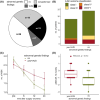The importance of routine genetic testing in pediatric epilepsy surgery
- PMID: 38366963
- PMCID: PMC10984286
- DOI: 10.1002/epi4.12916
The importance of routine genetic testing in pediatric epilepsy surgery
Abstract
Genetic variants in relevant genes coexisting with MRI lesions in children with drug-resistant epilepsy (DRE) can negatively influence epilepsy surgery outcomes. Still, presurgical evaluation does not include genetic diagnostics routinely. Here, we report our presurgical evaluation algorithm that includes routine genetic testing. We analyzed retrospectively the data of 68 children with DRE operated at a mean age of 7.8 years (IQR: 8.1 years) at our center. In 49 children, genetic test results were available. We identified 21 gene variants (ACMG III: n = 7, ACMG IV: n = 2, ACMG V: n = 12) in 19 patients (45.2%) in the genes TSC1, TSC2, MECP2, DEPDC5, HUWE1, GRIN1, ASH1I, TRIO, KIF5C, CDON, ANKD11, TGFBR2, ATN1, COL4A1, JAK2, KCNQ2, ATP1A2, and GLI3 by whole-exome sequencing as well as deletions and duplications by array CGH in six patients. While the results did not change the surgery indication, they supported counseling with respect to postoperative chance of seizure freedom and weaning of antiseizure medication (ASM). The presence of genetic findings leads to the postoperative retention of at least one ASM. In our cohort, the International League against Epilepsy (ILAE) seizure outcome did not differ between patients with and without abnormal genetic findings. However, in the 7/68 patients with an unsatisfactory ILAE seizure outcome IV or V 12 months postsurgery, 2 had an abnormal or suspicious genetic finding as a putative explanation for persisting seizures postsurgery, and 3 had received palliative surgery including one TSC patient. This study highlights the importance of genetic testing in children with DRE to address putative underlying germline variants as genetic epilepsy causes or predisposing factors that guide patient and/or parent counseling on a case-by-case with respect to their individual chance of postoperative seizure freedom and ASM weaning. PLAIN LANGUAGE SUMMARY: Genetic variants in children with drug-resistant epilepsy (DRE) can negatively influence epilepsy surgery outcomes. However, presurgical evaluation does not include genetic diagnostics routinely. This retrospective study analyzed the genetic testing results of the 68 pediatric patients who received epilepsy surgery in our center. We identified 21 gene variants by whole-exome sequencing as well as deletions and duplications by array CGH in 6 patients. These results highlight the importance of genetic testing in children with DRE to guide patient and/or parent counseling on a case-by-case with respect to their individual chance of postoperative seizure freedom and ASM weaning.
Keywords: epilepsy; epilepsy surgery; outcome; pediatrics; variant.
© 2024 The Authors. Epilepsia Open published by Wiley Periodicals LLC on behalf of International League Against Epilepsy.
Conflict of interest statement
None of the authors has any conflict of interest to disclose.
Figures


Similar articles
-
Pediatric epilepsy surgery from 2000 to 2018: Changes in referral and surgical volumes, patient characteristics, genetic testing, and postsurgical outcomes.Epilepsia. 2023 Sep;64(9):2260-2273. doi: 10.1111/epi.17670. Epub 2023 Jul 21. Epilepsia. 2023. PMID: 37264783 Free PMC article.
-
Seizure features and outcomes in 50 children with GATOR1 variants: A retrospective study, more favorable for epilepsy surgery.Epilepsia Open. 2023 Sep;8(3):969-979. doi: 10.1002/epi4.12770. Epub 2023 Jul 10. Epilepsia Open. 2023. PMID: 37259768 Free PMC article. Review.
-
Clinical factors predict surgical outcomes in pediatric MRI-negative drug-resistant epilepsy.Seizure. 2016 Oct;41:56-61. doi: 10.1016/j.seizure.2016.07.004. Epub 2016 Jul 20. Seizure. 2016. PMID: 27474907
-
Outcomes of resective surgery in pediatric patients with drug-resistant epilepsy: A single-center study from the Eastern Mediterranean Region.Epilepsia Open. 2023 Sep;8(3):930-945. doi: 10.1002/epi4.12761. Epub 2023 Jun 7. Epilepsia Open. 2023. PMID: 37162422 Free PMC article.
-
Epilepsy surgery outcomes in patients with GATOR1 gene complex variants: Report of new cases and review of literature.Seizure. 2023 Apr;107:13-20. doi: 10.1016/j.seizure.2023.03.004. Epub 2023 Mar 12. Seizure. 2023. PMID: 36931189 Review.
Cited by
-
Somatic DNA Variants in Epilepsy Surgery Brain Samples from Patients with Lesional Epilepsy.Int J Mol Sci. 2025 Jan 19;26(2):815. doi: 10.3390/ijms26020815. Int J Mol Sci. 2025. PMID: 39859528 Free PMC article.
References
MeSH terms
Substances
Grants and funding
LinkOut - more resources
Full Text Sources
Medical
Miscellaneous

